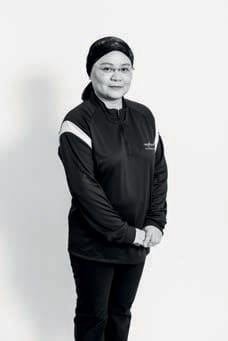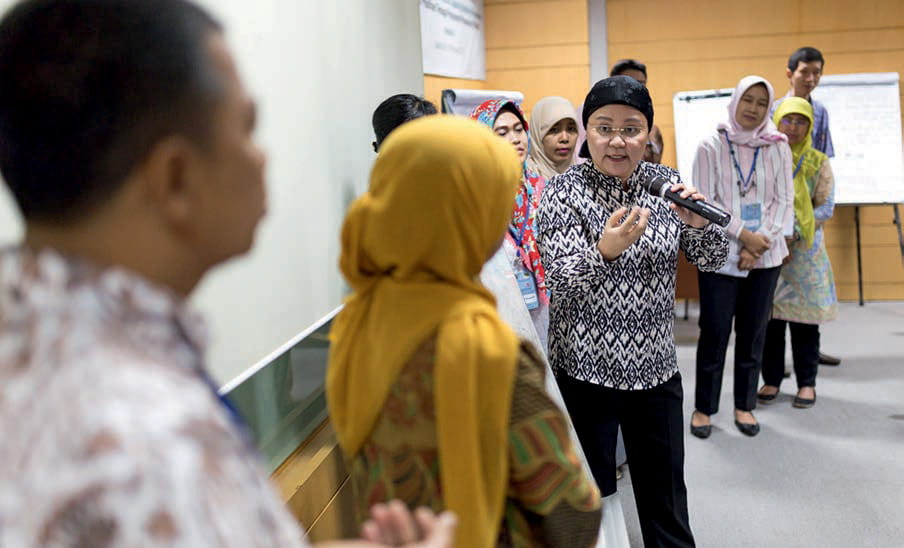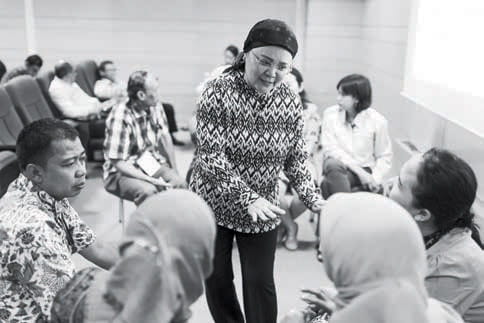Stories > Guiding Light for Community Care
Guiding Light for Community Care
This veteran social worker has taught hundreds of people how to care for the old and infirm, who want to spend their twilight years at home.
BY WONG SHER MAINE
PHOTOS SINGAPORE INTERNATIONAL FOUNDATION, ZAHARA MAHMOOD
eteran Singaporean social worker Zahara Mahmood, 48, was among four persons who received the highest accolade at Singapore’s annual Healthcare Humanity Awards, the distinguished Honourable Mention, from then President Tony Tan Keng Yam in April 2017. The award, launched in 2003, recognises healthcare workers with exceptional qualities and dedication.
Zahara’s passion for helping the needy sees her going above and beyond her local duties as a Community Coordinator with the Eastern Health Alliance (EHA). She has inspired and trained local volunteers, and healthcare professionals and families in Indonesia.
Interestingly, she did not start out in healthcare. After graduating in 1991 with a degree in social work, she accrued experience at various organisations. The roles she took on ranged from being a MUIS (the Islamic Religious Council of Singapore) welfare officer helping the lower income group to tap on financial assistance schemes, to a 10- year stint at Yayasan MENDAKI (Council for the Development of Singapore Malay/Muslim Community) where she worked with other self-help groups and helped run a programme to bring imprisoned mothers and their children together.
In 2007, Zahara decided to try something different. “As a social worker, there are many settings you can go into. I had tried out the courtroom setting, the prison setting, and the community setting. The only thing I had not tried was the hospital,” she says.
She joined Changi General Hospital, now a part of EHA, and got involved in counselling the families of tumour patients. She also ran a support group for Malay-speaking patients at the National Cancer Centre Singapore (NCCS).
Today, as EHA’s head of community care, Zahara manages other healthcare practitioners and spearheads healthcare programmes. One of these – Neighbours for Active Living (Friend a Senior) – mobilises the community to help look after frail elderly persons who are admitted to hospital three or more times in a year.

“Itʼs about gotong royong (ʻmutual helpʼ in Bahasa Melayu) and getting everybody excited about helping their fellow neighbours. ”
Zahara Mahmood, healthcare worker and volunteer
Officially launched on Jan 25, 2014, and starting in the Bedok and Siglap areas, the programme, known as Neighbours for short, now encompasses about 3,600 elderly patients spread across eastern Singapore. To date, it has effectively trained and matched nearly 400 volunteers with frail elderly persons, to ensure that the latter are looked after. Most of these volunteers are adult neighbours of the elderly patients, including housewives who sometimes cook extra food to give to their elderly charges.
Zahara says that while Neighbours employs 50 or so full-time staff, its volunteers are indispensable. “While our team can be effective in the daytime, dropping in on the elderly to check on them, we need extra eyes, hands, and legs on weekends and after office hours,” she notes.

Zahara employs humour and role-play in her training sessions, and her warm personality has gone a long way towards helping her workshop participants receive and retain the knowledge she shares with them.
REACHING OTHER SHORES
In 2011, Dr Cynthia Goh, a senior consultant in the Division of Palliative Medicine at NCCS, invited Zahara to join a Singapore International Foundation (SIF) mission to Indonesia as a volunteer. Dr Goh felt that her experience in palliative care and fluency in Malay would come in useful.
The mission was part of a two-year paediatric palliative care project between the SIF and Rachel House, a non-governmental paediatric hospice for the poor in Jakarta, which ran from 2009 to 2011. It was extended by another year after Rachel House persuaded the biggest hospital in Indonesia, Cipto Mangunkusumo National General Hospital, to host two SIF workshops for their paediatric palliative doctors and nurses.
On her first trip, Zahara was involved in coaching the families of cancer-stricken children on how to cope with death and grief. She has since been back several times – most recently in September 2017 – to train and share her experience in end-of-life care with local doctors and nurses.
One workshop participant, Dr Hilda from Rumah Sakit Cipto Mangunkusumo Jakarta, says: “The training Zahara provided gave me an opportunity to sharpen my skills and increased my passion in palliative care for my cancer-stricken patients.” Now, seven years on, Zahara is struck by the fact that while morphine is effective in pain management, which is critical in palliative care, the take-up rate is low in Indonesia. “This could be due to a misconception that the drug is addictive,” she says. “Hopefully, through our training, we can change mindsets.”
Indonesia comprises nearly 1,000 inhabited islands. Zahara has observed that when people are ill with terminal diseases like cancer, they do not want to have to travel all the way to a big city like Jakarta for treatment. They would rather stay at home in the last stages of their lives. This makes the development of community palliative care very important.
She is trying to address this through her training. Some of her course participants are nurses and healthcare professionals who are based in the smaller islands, and once trained, they become well-placed to provide home care when they return. “People there will then realise that palliative support in the community is good enough to support them,” says Zahara.

Group discussions during Zaharaʼs sharing sessions facilitate the sharing of knowledge and experience between participants, and encourage the formation of friendships.
SPARKING COMPASSION IN OTHERS
Whether overseas or at home, the training she provides makes an impact – not just on those being cared for, but also their caregivers. Ong Qiu Lin, 24, a Temasek Polytechnic gerontology management student who has been attached to Neighbours since September as part of her internship, says Zahara has an uplifting effect on the volunteers. “Everyone loves her training; she is really funny and expressive and she inspires her trainees. Most of them sign up to be volunteers after her sessions,” Ong says.
About 100 of Neighbours’ volunteers are students from Bedok Secondary School and Ping Yi Secondary School (PYSS). The PYSS students’ participation is facilitated by their school’s Community Involvement Programme. Some of them struggle with disciplinary issues. To help them, Zahara and her team devised a training workshop spanning five Tuesday afternoons, even coming up with Monopoly-style games, to teach the teens how to behave towards the elderly and to understand their needs.
“It was challenging in the beginning,” Zahara says. “But when they eventually visited the elderly folks, I was surprised that the elderly described them as angels! They were respectful and even helped the elderly to do housework. It was a huge effort to train them, but I feel that it was a worthwhile investment which ensures that the teens can contribute positively to the local community.” The students came away with deep impressions, many of which they shared with Zahara. Some thoroughly enjoyed visiting and interacting with the elderly, and some of the old folks shared their histories and stories with them. Most importantly, in the process of caring for the elderly, the teens learnt the value of community support and how everyone can all help one other. “Even after their volunteer stints ended, they continued saying ‘hello’ and asking after the elderly patients they looked after, when they saw each other in the neighbourhood,” Zahara says.
The pleasure of seeing the next generation catch the flame is one of the things that keeps Zahara going. “It’s about gotong royong (“mutual help” in Bahasa Melayu), and getting everybody excited about helping their fellow neighbours,” she says.
